易错英语翻译
- 格式:pdf
- 大小:105.05 KB
- 文档页数:4

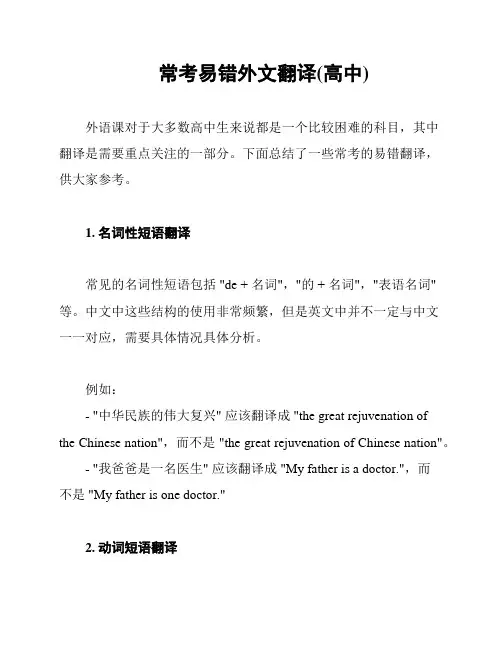
常考易错外文翻译(高中)外语课对于大多数高中生来说都是一个比较困难的科目,其中翻译是需要重点关注的一部分。
下面总结了一些常考的易错翻译,供大家参考。
1. 名词性短语翻译常见的名词性短语包括 "de + 名词","的 + 名词","表语名词" 等。
中文中这些结构的使用非常频繁,但是英文中并不一定与中文一一对应,需要具体情况具体分析。
例如:- "中华民族的伟大复兴" 应该翻译成 "the great rejuvenation ofthe Chinese nation",而不是 "the great rejuvenation of Chinese nation"。
- "我爸爸是一名医生" 应该翻译成 "My father is a doctor.",而不是 "My father is one doctor."2. 动词短语翻译动词短语也是翻译中容易出错的部分之一。
与名词性短语类似,动词短语也需要结合具体语境进行翻译。
例如:- "在电影院看电影" 应该翻译成 "watch a movie at the cinema",而不是 "see a movie at the cinema"。
- "交作业" 应该翻译成 "hand in homework",而不是 "give homework"。
3. 词汇搭配翻译英语中的词汇搭配相对比较固定,需要多加注意。
错误的词汇搭配往往会影响文章的语言流畅度和意义表达。
例如:- "打电话" 应该翻译成 "make a phone call",而不是 "have a phone call"。
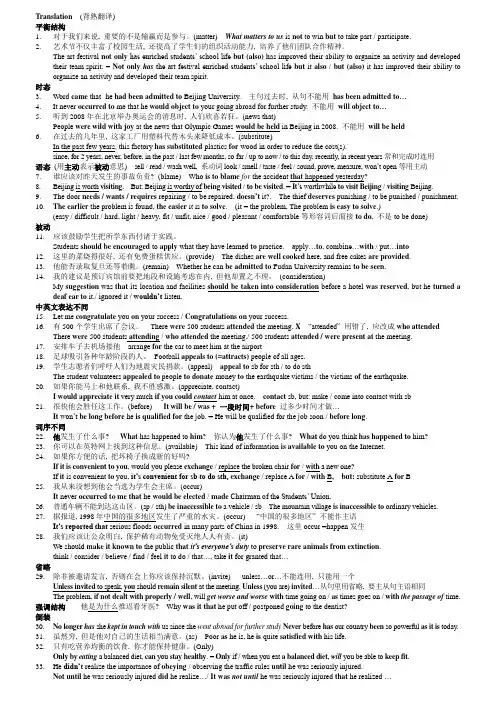
Translation (背熟翻译)平衡结构1.对于我们来说, 重要的不是输赢而是参与。
(matter) What matters to us is not to win but to take part / participate.2.艺术节不仅丰富了校园生活, 还提高了学生们的组织活动能力, 培养了他们团队合作精神。
The art festival not only has enriched students’ school life but (also) has improved their ability to organize an activity and developed their team spirit. = Not only has the art festival enriched students’ school life but it also / but (also) it has improved their ability to organize an activity and developed their team spirit.时态3.Word came that h e had been admitted to Beijing University. 主句过去时, 从句不能用has been admitted to…4.It never occurred to me that he would object to your going abroad for further study. 不能用will object to…5.听到2008年在北京举办奥运会的消息时, 人们欣喜若狂。
(news that)People were wild with joy at the news that Olympic Games would be held in Beijing in 2008. 不能用will be held6.在过去的几年里, 这家工厂用塑料代替木头来降低成本。
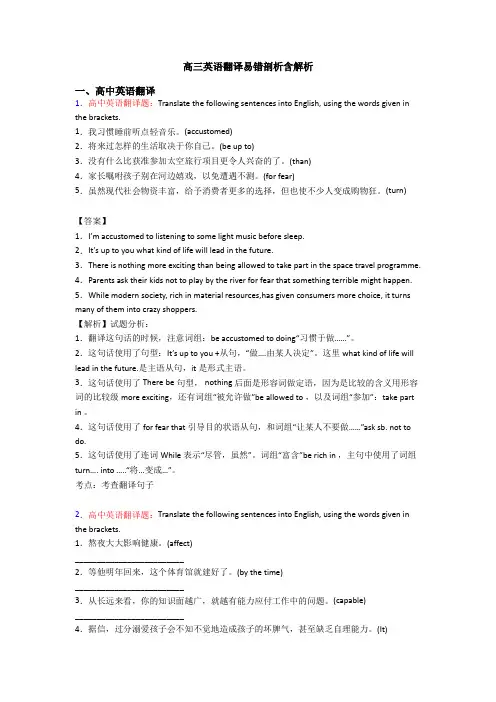
高三英语翻译易错剖析含解析一、高中英语翻译1.高中英语翻译题:Translate the following sentences into English, using the words given in the brackets.1.我习惯睡前听点轻音乐。
(accustomed)2.将来过怎样的生活取决于你自己。
(be up to)3.没有什么比获准参加太空旅行项目更令人兴奋的了。
(than)4.家长嘱咐孩子别在河边嬉戏,以免遭遇不测。
(for fear)5.虽然现代社会物资丰富,给予消费者更多的选择,但也使不少人变成购物狂。
(turn)【答案】1.I’m accustomed to listening to some light music before sleep.2.It’s up to you what kind of life will lead in the future.3.There is nothing more exciting than being allowed to take part in the space travel programme. 4.Parents ask their kids not to play by the river for fear that something terrible might happen. 5.While modern society, rich in material resources,has given consumers more choice, it turns many of them into crazy shoppers.【解析】试题分析:1.翻译这句话的时候,注意词组:be accust omed to doing“习惯于做……”。
2.这句话使用了句型:It’s up to you +从句,“做….由某人决定”。
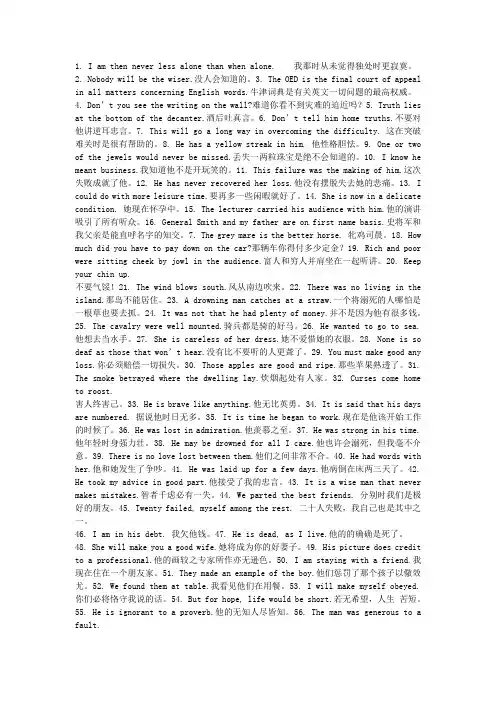
1. I am then never less alone than when alone. 我那时从未觉得独处时更寂寞。
2. Nobody will be the wiser.没人会知道的。
3. The OED is the final court of appeal in all matters concerning English words.牛津词典是有关英文一切问题的最高权威。
4. Don’t you see the writing on the wall?难道你看不到灾难的迫近吗?5. Truth lies at the bottom of the decanter.酒后吐真言。
6. Don’t tell him home truths.不要对他讲逆耳忠言。
7. This will go a long way in overcoming the difficulty. 这在突破难关时是很有帮助的。
8. He has a yellow streak in him. 他性格胆怯。
9. One or two of the jewels would never be missed.丢失一两粒珠宝是绝不会知道的。
10. I know he meant business.我知道他不是开玩笑的。
11. This failure was the making of him.这次失败成就了他。
12. He has never recovered her loss.他没有摆脱失去她的悲痛。
13. I could do with more leisure time.要再多一些闲暇就好了。
14. She is now in a delicate condition. 她现在怀孕中。
15. The lecturer carried his audience with him.他的演讲吸引了所有听众。
16. General Smith and my father are on first name basis.史将军和我父亲是能直呼名字的知交。
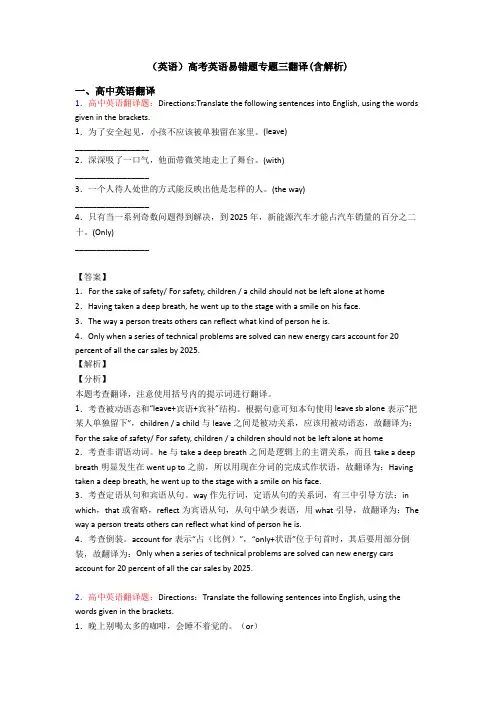
(英语)高考英语易错题专题三翻译(含解析)一、高中英语翻译1.高中英语翻译题:Directions:Translate the following sentences into English, using the words given in the brackets.1.为了安全起见,小孩不应该被单独留在家里。
(leave)_________________2.深深吸了一口气,他面带微笑地走上了舞台。
(with)_________________3.一个人待人处世的方式能反映出他是怎样的人。
(the way)_________________4.只有当一系列奇数问题得到解决,到 2025 年,新能源汽车才能占汽车销量的百分之二十。
(Only)_________________【答案】1.For the sake of safety/ For safety, children / a child should not be left alone at home 2.Having taken a deep breath, he went up to the stage with a smile on his face.3.The way a person treats others can reflect what kind of person he is.4.Only when a series of technical problems are solved can new energy cars account for 20 percent of all the car sales by 2025.【解析】【分析】本题考查翻译,注意使用括号内的提示词进行翻译。
1.考查被动语态和“leave+宾语+宾补”结构。
根据句意可知本句使用 leave sb alone表示“把某人单独留下”,children / a child与leave之间是被动关系,应该用被动语态,故翻译为:For the sake of safety/ For safety, children / a children should not be left alone at home2.考查非谓语动词。
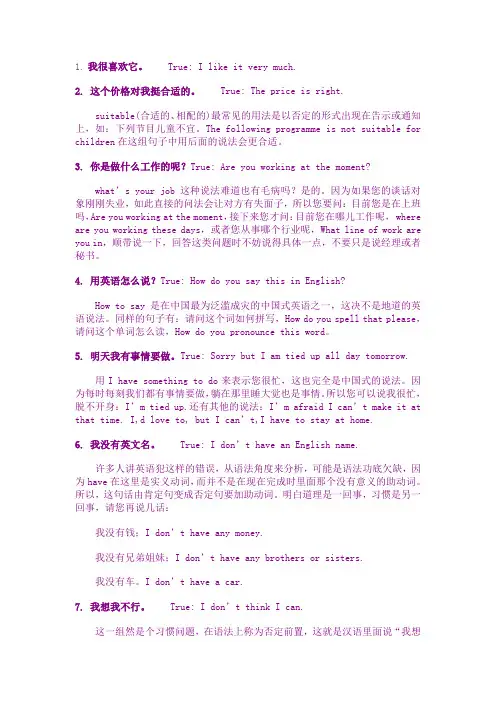
1.我很喜欢它。
True: I like it very much.2. 这个价格对我挺合适的。
True: The price is right.suitable(合适的、相配的)最常见的用法是以否定的形式出现在告示或通知上,如:下列节目儿童不宜。
The following programme is not suitable for children在这组句子中用后面的说法会更合适。
3. 你是做什么工作的呢?True: Are you working at the moment?what’s your job这种说法难道也有毛病吗?是的。
因为如果您的谈话对象刚刚失业,如此直接的问法会让对方有失面子,所以您要问:目前您是在上班吗,Are you working at the moment,接下来您才问:目前您在哪儿工作呢, where are you working these days,或者您从事哪个行业呢,What line of work are you in,顺带说一下,回答这类问题时不妨说得具体一点,不要只是说经理或者秘书。
4. 用英语怎么说?True: How do you say this in English?How to say是在中国最为泛滥成灾的中国式英语之一,这决不是地道的英语说法。
同样的句子有:请问这个词如何拼写,How do you spell that please,请问这个单词怎么读,How do you pronounce this word。
5. 明天我有事情要做。
True: Sorry but I am tied up all day tomorrow.用I have something to do来表示您很忙,这也完全是中国式的说法。
因为每时每刻我们都有事情要做,躺在那里睡大觉也是事情。
所以您可以说我很忙,脱不开身:I’m tied up.还有其他的说法:I’m afraid I can’t make it at that time. I,d love to, but I can’t,I have to stay at home.6. 我没有英文名。

初中英语易错词汇1.affect 和effect:常被误用。
affect是动词,意为“影响”;effect是名词,意为“效果”或“影响”。
2.advice 和advise:advice是名词,意为“建议”;advise是动词,意为“建议”。
3.between 和among:between用于两者之间,among用于三者或三者以上之间。
4.borrow 和lend:borrow意为“借入”,lend意为“借出”。
5.bring 和take:bring意为“带来”,take意为“带走”。
6.can 和may:can表示能力或可能性,may表示许可或可能。
7.few 和little:few修饰可数名词,little修饰不可数名词。
8.healthy 和healthily:healthy是形容词,healthily是副词。
9.its 和it's:its是形容词性物主代词,it's是it is的缩写。
10.know 和knew:know是现在时,knew是过去时。
11.lie 和lay:lie是不及物动词,意为“躺”;lay是及物动词,意为“放置”。
12.lose 和miss:lose意为“丢失”,miss意为“想念”或“错过”。
13.noise 和voice:noise是噪音,voice是人的声音。
14.pass 和past:pass是动词,past是介词或副词。
15.problem 和question:problem指需要解决的问题,question指问题或疑问。
16.quiet 和quite:quiet是形容词,意为“安静的”;quite是副词,意为“非常”。
17.receive 和accept:receive指收到,accept指接受。
18.say 和speak:say强调说话内容,speak强调说话动作。
19.since 和for:since与时间点连用,for与时间段连用。
20.some time 和sometime:some time表示一段时间,sometime表示某个时候。
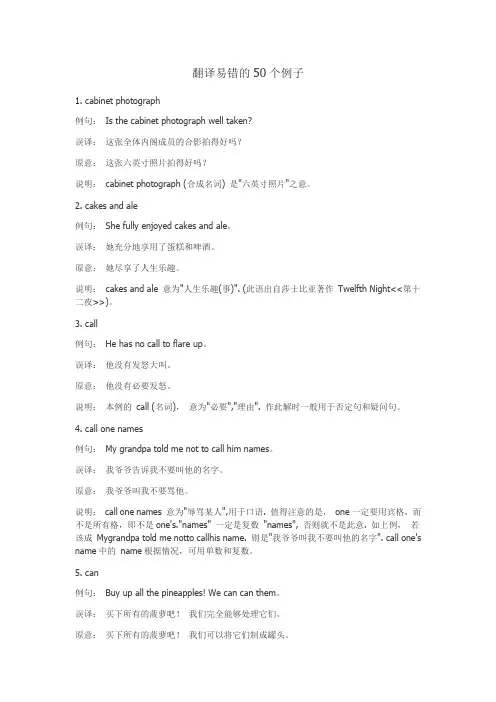
翻译易错的50个例子1. cabinet photograph例句:Is the cabinet photograph well taken?误译:这张全体内阁成员的合影拍得好吗?原意:这张六英寸照片拍得好吗?说明:cabinet photograph (合成名词) 是"六英寸照片"之意。
2. cakes and ale例句:She fully enjoyed cakes and ale。
误译:她充分地享用了蛋糕和啤酒。
原意:她尽享了人生乐趣。
说明:cakes and ale 意为"人生乐趣(事)". (此语出自莎士比亚著作Twelfth Night<<第十二夜>>)。
3. call例句:He has no call to flare up。
误译:他没有发怒大叫。
原意:他没有必要发怒。
说明:本例的call (名词),意为"必要","理由". 作此解时一般用于否定句和疑问句。
4. call one names例句:My grandpa told me not to call him names。
误译:我爷爷告诉我不要叫他的名字。
原意:我爷爷叫我不要骂他。
说明:call one names 意为"辱骂某人",用于口语. 值得注意的是,one一定要用宾格,而不是所有格,即不是one's."names" 一定是复数"names", 否则就不是此意. 如上例,若该成Mygrandpa told me notto callhis name. 则是"我爷爷叫我不要叫他的名字". call one's name中的name根据情况,可用单数和复数。
5. can例句:Buy up all the pineapples! We can can them。
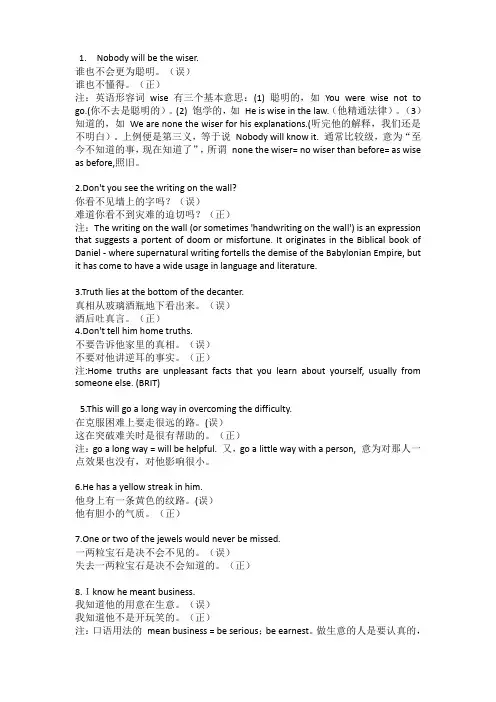
1. Nobody will be the wiser.谁也不会更为聪明。
(误)谁也不懂得。
(正)注:英语形容词wise 有三个基本意思:(1) 聪明的,如You were wise not to go.(你不去是聪明的)。
(2) 饱学的,如He is wise in the law.(他精通法律)。
(3)知道的,如We are none the wiser for his explanations.(听完他的解释,我们还是不明白)。
上例便是第三义,等于说Nobody will know it. 通常比较级,意为“至今不知道的事,现在知道了”,所谓none the wiser= no wiser than before= as wise as before,照旧。
2.Don't you see the writing on the wall?你看不见墙上的字吗?(误)难道你看不到灾难的迫切吗?(正)注:The writing on the wall (or sometimes 'handwriting on the wall') is an expression that suggests a portent of doom or misfortune. It originates in the Biblical book of Daniel - where supernatural writing fortells the demise of the Babylonian Empire, but it has come to have a wide usage in language and literature.3.Truth lies at the bottom of the decanter.真相从玻璃酒瓶地下看出来。
(误)酒后吐真言。
(正)4.Don't tell him home truths.不要告诉他家里的真相。
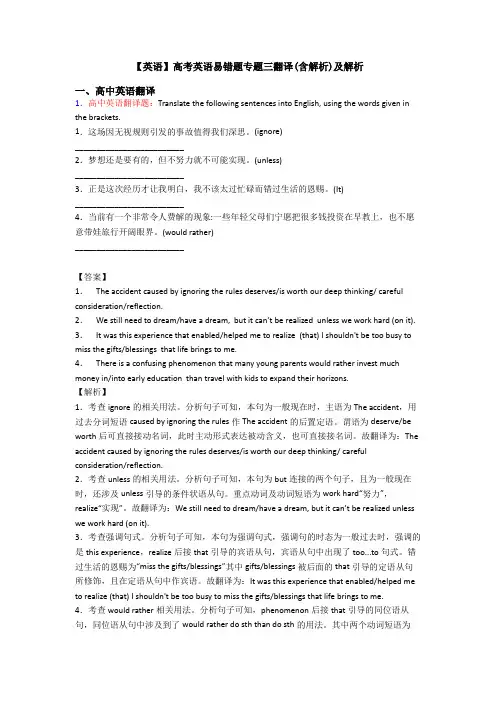
【英语】高考英语易错题专题三翻译(含解析)及解析一、高中英语翻译1.高中英语翻译题:Translate the following sentences into English, using the words given in the brackets.1.这场因无视规则引发的事故值得我们深思。
(ignore)_________________________2.梦想还是要有的,但不努力就不可能实现。
(unless)_________________________3.正是这次经历才让我明白,我不该太过忙碌而错过生活的恩赐。
(It)_________________________4.当前有一个非常令人费解的现象:一些年轻父母们宁愿把很多钱投资在早教上,也不愿意带娃旅行开阔眼界。
(would rather)_________________________【答案】1. The accident caused by ignoring the rules deserves/is worth our deep thinking/ careful consideration/reflection.2.We still need to dream/have a dream, but it can’t be realized unless we work hard (on it). 3. It was this experience that enabled/helped me to realize (that) I shouldn't be too busy to miss the gifts/blessings that life brings to me.4. There is a confusing phenomenon that many young parents would rather invest much money in/into early education than travel with kids to expand their horizons.【解析】1.考查ignore的相关用法。
英汉汉英翻译易错句 138 例1. It pays to get an education. 受教育是划算的。
2. She pulled her car in the drive. 他把车子停在私家车道上了。
此处 drive 作名词解释为“私家车道”。
3. The young man walked far into the woods to make water. 那些年轻人走进森林深处去小便。
4. She always sleeps very late. 他经常起得很迟。
5. The revolutionaries were beaten, refused anything to eat. 那些革命者受到拷打,不准吃任何东西。
6. Michael is a man of many trades. Michael 是一个从事很多行业的人。
7. Compare the adjective “able”. 说出 able 的原级、比较级和最高级。
8. The tunnel is 20 meters below the sea. 隧道在海床底下 20 米。
海面下译为 below the sea level/surface。
9. It is not a job for a man of his size. 他这般能力人干这种工作不合适。
10. They were full brothers and lived a fast life. 他们是亲兄弟,过着放荡的生活。
11. This is a bottle of noble gas. 这是一瓶惰性气体。
12. Her eyes were shinning, but her face lost its color within twenty seconds. 她双目闪着光芒,可她的脸色骤然变了13. What she sent to me was an apology for a letter. 他寄给我了一封不像样的信。
高考英语易错题专题三翻译(含解析)含解析一、高中英语翻译1.高中英语翻译题:Translate the following sentences into English, using the words given in the brackets.1.美食是人们造访上海的乐趣之一。
(visit)2.街头艺术家运用创意将鲜艳明亮的色彩带进了老社区。
(bring)3.在你生命中,如果有一个人你需要对他说对不起,那么就去向他道歉吧。
(apology)4.这个游戏的独特之处在于它让孩子学会如何应对现实生活中的问题。
(what)5.申请材料需要精心准备,这样你心仪的学校才会对你的能力有全面、准确地了解。
(in order that)【答案】1.Delicious food is one of the pleasures when people visit Shanghai.2.Street artists bring bright and vivid colors into older neighborhoods with originality3.If there is someone to whom you need say sorry in your life, make an apology to him. 4.What makes this game peculiar lies in that it teaches kids how to handle the problems in real life.5.The applications should be carefully prepared in order that the school you like can have an overall and accurate knowledge of your abilities.【解析】【分析】1.本句重点考察两个知识点。
1、如果你努力学习,你肯定会有机会实现梦想的。
(sure,achieve)2.他是那么认真地对待他的工作,因此没必要担心他的成功。
(unless,let…down)3.小李每天花大量的时间打电脑游戏,这已经影响他的工作了。
(serious,necessary)4.你应该先征求父母的意见才能决定是否能打电脑游戏。
(ask one’s permission, if)5.他精力充沛,每天都跑步锻炼身体。
(energy, exercise)6.知道自己将代表班级去参加演讲比赛,她高兴极了。
(after )7.王先生卖菜为生,他把所有的钱都捐给了医学研究。
(make a living …,give…to)8.令大家惊讶的是,那位严厉的老师对孩子们如此有耐心。
(to one’s surprise)9.老师们总是为了每一个实现了自己梦想的学生感到骄傲。
(take pride,who)10.他因支付不起学费,最终放弃了上大学的机会。
(the chance of, afford)11.你如果不注意你的行为举止,会惹麻烦的。
(the way, behave)12.自从车站搬走以来,这儿再也不像以前那样吵闹了。
(as…as)13.他意识到太多的压力会阻碍自己的成长。
(pressure, development)14.我过去常常熬夜到12点,所以白天很困倦。
(sleepy)15.令我惊讶的是,即使教室很吵闹,他也能专心学习。
(concentrate on)16.认真对待每一件事情,你就不必担忧成功。
(worry about)17.别放弃实现梦想的每一个机会,一定要坚定梦想。
(give up )18.老师鼓励我们努力学习,他们也期盼着我们的成功。
(encourage…to ,look forward to )19.你有一个很小的朋友圈子,你的朋友或许会说你是一个很好的听众。
(a circle of )20.我认为学生不应该被允许一起做作业,他们在一起老是聊天而不是做作业。
易错英语单词单词:abandon1. 定义与释义1.1词性:动词1.2中文释义:放弃;遗弃;抛弃1.3英文释义:To give up completely; to leave someone or something, usually forever.1.4同义词:desert、forsake、give up;派生词:abandoned (形容词)、abandonment(名词)2. 起源与背景2.1词源:源自古法语“abandoner”,可追溯到拉丁语“bannum”(公告、命令),最初表示“置于别人的控制或影响之下”,后来演变为现在的意思。
2.2趣闻:在航海中,如果一艘船被“abandon”,那就是说船员们放弃了这艘船,这种情况往往是船遇到了极大的危险,无法继续航行。
3. 常用搭配与短语3.1短语:- abandon oneself to:沉溺于,放纵于 + 例句:He abandoned himself to despair. 翻译:他陷入绝望之中。
- with abandon:尽情地;放纵地 + 例句:The children played in the park with abandon. 翻译:孩子们在公园里尽情玩耍。
- abandon ship:弃船(航海术语) + 例句:When the captain ordered to abandon ship, everyone rushed to the lifeboats. 翻译:当船长下令弃船时,每个人都冲向救生艇。
4. 实用片段(1). "I'm so tired of this project. I want to abandon it." Tom said to his partner. His partner replied, "But we've already put so much effort into it. We can't just abandon it like that."翻译:“我对这个项目厌倦极了,我想放弃它。
1. Nobody will be the wiser.谁也不会更为聪明。
(误)谁也不懂得。
(正)注:英语形容词wise 有三个基本意思:(1) 聪明的,如You were wise not to go.(你不去是聪明的)。
(2) 饱学的,如He is wise in the law.(他精通法律)。
(3)知道的,如We are none the wiser for his explanations.(听完他的解释,我们还是不明白)。
上例便是第三义,等于说Nobody will know it. 通常比较级,意为“至今不知道的事,现在知道了”,所谓none the wiser= no wiser than before= as wise as before,照旧。
2.Don't you see the writing on the wall?你看不见墙上的字吗?(误)难道你看不到灾难的迫切吗?(正)注:The writing on the wall (or sometimes 'handwriting on the wall') is an expression that suggests a portent of doom or misfortune. It originates in the Biblical book of Daniel - where supernatural writing fortells the demise of the Babylonian Empire, but it has come to have a wide usage in language and literature.3.Truth lies at the bottom of the decanter.真相从玻璃酒瓶地下看出来。
(误)酒后吐真言。
(正)4.Don't tell him home truths.不要告诉他家里的真相。
1.Do you have a family?
正确译文:你有孩子吗?
2.It's a good father that knows his son。
就算是最好的父亲,也未必了解自己的儿子。
3.I have no opinion of that sort of man。
我对这类人很反感。
4.She put 5 dollars into my hand,"you have been a great man today."
她把5美圆塞到我手上说:"你今天表现得很好."
5.I was the youngest son, and the youngest but two。
我是最小的儿子,但是我还有两个妹妹。
6.The picture flattered her。
她比较上照。
7.The country not agreeing with her, she returned to England。
她杂那个国家水土不服,所以回到了英国。
8. He is a walking skeleton。
他很瘦。
9.The machine is in repair。
机器已经修好了。
10.He allowed the father to be overruled by the judge, and declared his own son guilty。
他让法官的职责战胜了父子的亲情,最终宣布儿子有罪。
11.You don't know what you are talking about。
你在胡说八道。
12.You don't begin to understand what they mean。
你根本不知道他们在干嘛. don't begin :决不
13.They didn't praise him slightly。
他们大大地表扬了他。
14.That's all I want to hear。
我已经听够了。
15.I wish I could bring you to see my point。
你要我怎么说你才能明白呢。
16.You really flatter me。
你让我受宠若惊。
17.He made a great difference。
有他没他结果完全不一样。
18.You cannot give him too much money。
你给他再多的钱也不算多。
19.The long exhausting trip proved too much。
这次旅行矿日持久,我们都累倒了。
20.The monk is only not a dead man。
这个和尚虽然活着,但跟死了差不多。
21.A surgeon made a cut in the patient's stomach。
外科医生在病人胃部打了个洞。
22.You look darker after the holiday。
你看上去更健康了。
23.As luck would have it, he was caught by the teacher again。
不幸的是,他又一次被老师逮个正着。
24.She held the little boy by the right hand。
她抓着小男孩的右手。
(这里"by"与"with"动作主语完全相反。
)
25.Are you there?
等于句型:Do you follow me?
26.If you think he is a good man, think again。
如果你认为他是好人,那你就大错特错了。
27.She has blue eyes。
她长着双蓝眼睛。
28.That took his breath away。
他大惊失色。
29.Two is company but three is none。
两人成伴,三人不欢。
30.The elevator girl reads between passengers。
开电梯的姑娘在没有乘客时看书。
"between"="without":相同用法:She modeled between roles。
译成:她不演戏时去客串下模特。
31.Students are still arriving。
学生还没有到齐。
32.I must not stay here and do nothing。
我不能什么都不做待在这儿。
33.They went away as wise as they came。
译文:他们一无所获。
34.I won’t do it to save my life。
译文:我死也不会做。
35.Nonsense, I don’t think his painting is any better than yours。
译文:胡说,我认为他的画比你好不到哪去。
36.Traditionally, Italian presidents have been seen and not heard。
译文:这个总统有名无权。
37.Better late than the late。
译文:迟到总比丧命好。
38.You don’t want to do that。
译文:你不应该去做。
39.My grandfather is nearly ninety and in his second childhood。
译文:我祖父快90岁了,什么事都需要别人来做。
40.Work once and work twice。
译文:一次得手,再次不愁。
41.Rubber easily gives way to pressure。
译文:橡胶很容易变形。
42.If my mother had known of it she'd have died a second time。
译文:要是我妈妈知道了,她会从棺材里爬起来。